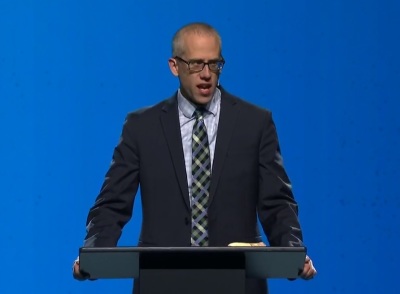Kevin DeYoung: The ‘Heartbeat of Jesus’ ministry’ was not ‘to transform social structures’

Christ Covenant Church Senior Pastor Kevin DeYoung warned attendees at an evangelical conference that the key point of Jesus’ earthly ministry was to proclaim the Good News and not to “transform social structures.”
The pastor and author gave a speech on Tuesday at The Gospel Coalition’s 2019 National Conference in Indianapolis, Indiana, the theme being “Conversations with Jesus."
DeYoung preached about Luke 4:14-30, in which Jesus attends worship at a synagogue in his hometown and reads from the Old Testament book of Isaiah, specifically the passage that reads: “The Spirit of the Lord is on me, because He has anointed me to proclaim good news to the poor. He has sent me to proclaim freedom for the prisoners and recovery of sight for the blind, to set the oppressed free, to proclaim the year of the Lord’s favor.”
DeYoung noted that the passage was considered by many to be “the very heartbeat of Jesus’ ministry” and that many also argued that it meant social reform was a key part of His ministry.
“Then I would often have people say to me that what we see here is Jesus’ ministry was one, to focus upon the poor and the oppressed and the downtrodden, to bring God’s creation back to Shalom, and to transform social structures,” said DeYoung.
DeYoung explained that the passage was “a key text” for traditions like Liberation Theology, which argues that the Bible should be interpreted from the perspective of the poor and that the church is obligated to engage in socio-economic change.
While Liberation Theology is largely concentrated in Latin America, groups within the United States like the Red Letter Christians movement also stress this socio-economic focus.
“Jesus calls us away from the consumerist values that dominate contemporary America. Instead, he calls us to meet the needs of the poor,” notes RLC’s website.
“He also calls us to be merciful, which has strong implications in terms of war and capital punishment. After all, when Jesus tells us to love our enemies, he probably means we shouldn’t kill them.”
In his speech before the conference on Tuesday, DeYoung said that he believed the socio-economic justice focus “is not the most careful way to exegete this passage.”

In his critique, DeYoung pointed out that of the four verbs used in the Isaiah passage quoted by Jesus, all but one of them had to do with proclamation rather than works.
“So yes, this is a key text for defining Jesus’ mission and the methods of His ministry, but what do we see here? We see that the Spirit has anointed Him chiefly to be a preacher. To proclaim a message of Good News,” said DeYoung.
Regarding the fourth verb from the passage, which spoke of liberating captives, DeYoung noted that since the Gospels do not record Jesus literally freeing captives, it should be understood exclusively “on a spiritual plane.”
“That the recovery of sight to the blind was spiritual sight for those blinded by sin. Those who would have demons cast out was ultimately a pointer to the spiritual freedom that we find only in Christ,” he continued.
“In other words, we see that the mission of Jesus was first and foremost to proclaim the Good News of the Gospel of salvation for sinners.”
While the Gospels show Jesus’ ministry centered on three things: preaching, casting out demons, and healing the sick, explained DeYoung, they were not treated as equally important by Jesus.
“There is not a single example of Jesus going into a town with the purpose of healing or casting out demons. He never ventures out on a healing or an exorcism tour,” said DeYoung. “The reason He came out to public ministry was to preach.”
DeYoung then quoted Luke 4:42-43 to further his point, noting that when the locals urged Jesus to stay upon healing many, Jesus replies: “I must proclaim the good news of the kingdom of God to the other towns also, because that is why I was sent.”
DeYoung concluded his speech by noting three lessons from the biblical passage. The first lesson was to note the importance of preaching the Gospel, the second was to note that the church should be prepared for all sorts of outsiders to come to faith, and finally, that people who proclaim the Good News should expect to be misunderstood.
“You and I are not prepared to do ministry in this world, in this day unless we are prepared to be misunderstood,” explained DeYoung.
“Sometimes by people honestly trying to understand and sometimes by people willfully misunderstanding. Jesus was misunderstood."





















